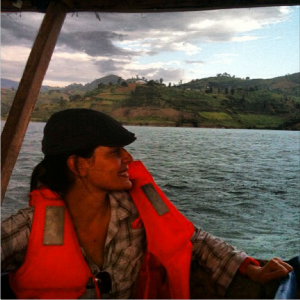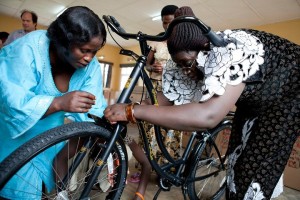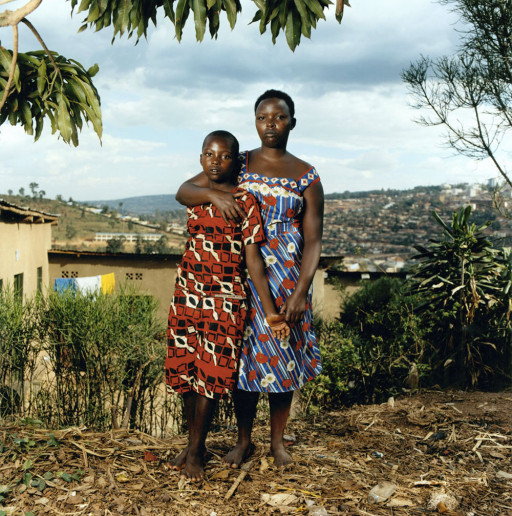Today marks the 20th anniversary of one of the most horrific events in modern history. Between April and June of 1994, an estimated 800,000 Tutsis were killed in the span of 100 days in the small central African country of Rwanda. The ramifications of this genocide continue to this day. In Intended Consequences, Jonathan Torgovnik, MediaStorm and our partners at Foundation Rwanda examined particularly tragic stories left behind by the Hutu militia – the lives of the women they held captive, raped – and left pregnant.
20 years later, Rwanda is able to tell a story that once seemed unlikely, one of optimism and resurgence. Jules Shell, Executive Director & Co-founder of Foundation Rwanda, offers a glimpse into the challenges and triumphs survivors of the genocide face today.
What signs of recovery have you seen in Rwanda over the past two decades?
Jules Shell: Rwanda has made great strides since the genocide, in the rebuilding of the country. There has been a lot of development and investment, in particular in building the capacity of the government to deliver essential services such as primary education and healthcare. However, there are still great challenges for the country which is still one of the least developed in the world (ranked 167 out of 187 countries in the Human Development Index 2012). Vulnerable and marginalized populations within the country, such as women genocide survivors, and their children born of rape, still have particular challenges resulting from the genocide – which is why Foundation Rwanda is specifically focused on delivering support specifically to them.

What are the major challenges for the country moving forward?
Shell: The greatest challenge for the country is to continue its economic development, and in so doing alleviate extreme poverty and hunger still particularly prevalent in more rural communities outside of Kigali. Continuing to build the government’s capacity to deliver essential services – such as healthcare, education, social protection- is also very important. It is imperative that Rwanda ensure that vulnerable and marginalized populations, such as genocide survivors and children born of genocidal rape, are supported and able to access education and support due to the physical, social and economic disadvantage they continue to face as a result of their experience during the genocide. I have heard from the Foundation Rwanda mothers time and time again that education for their children is everything to them; only secondary to that do they advocate for their own counseling and income generating opportunities.
One great positive is that there has been a great focus on women’s empowerment in Rwanda, and as such it is one of the few countries in the world with a majority of female parliamentarians. Though there are also still challenges for women in Rwanda, as there are in every country. In Rwanda, there are still challenges around gender-based violence in particular. Many mothers we work with are now reporting domestic violence if they remarried and incidents where their children born of rape are being mistreated by their husbands.
How did sharing the stories depicted in Intended Consequences impact Foundation Rwanda’s work?
Shell: Intended Consequences has been a very powerful vehicle to share the mothers’ testimonies in their own words. It has played around the world at universities, galleries, festivals and you can always hear a pin drop afterwards. The film continues to be viewed online through the MediaStorm website, and will continue to be available as a matter of record. The fact that the film was nominated for an Emmy award has allowed for it to be seen by an even larger audience, enabling us to raise critical awareness and to help ensure that these mothers’ stories continue to be heard around the world.
There has been interest in particular stories of those women featured in the original Intended Consequences photo exhibition, which we have recently followed up with subsequent filming to see how they are doing after receiving support from Foundation Rwanda over the past six years.
Can you provide any updates on the women depicted in Intended Consequences?
Shell: There are updates in our most recent annual report.
The stigma is still severe for many of the Foundation Rwanda mothers. Many women still have not publicly acknowledged that their children were born of rape, though their children are aware that they have no known father – which in itself also presents problems as they seek to register for national identity cards (required for marriage) which requires the identification of both their father and mother. As such, the importance of supporting the women who choose to disclose the circumstance of their birth to their children is particularly pressing at this time – which is why we are scaling up the Foundation Rwanda Community Counseling Initiative with our partner organizations, including Survivors Fund (SURF), over the year ahead.
How are their children impacted?
Shell: The consequences of genocide affect these children, even though they were born after genocide, in a different way to their mothers, who are survivors and directly experienced the genocide. Though its effects are no less profound. Many of the “second generation survivors” are experiencing a phenomena common to the children of Holocaust survivors, known as the intergenerational inheritance of trauma – which has resulted from the inability of the mothers to speak openly to their children about their experiences, and own trauma, which in turn affects them. The physical consequences of genocide also effects them too, in respect to dilapidated or destroyed homes, as well as lack of land and livestock, the loss of which during the genocide has never been restituted.

(source: Foundation Rwanda Facebook page)
What is Foundation Rwanda’s major focus now?
Shell: As the world commemorates the 20th anniversary of the Rwandan genocide against the Tutsi, Foundation Rwanda is forging ahead with its work to change the lives of Rwandan mothers and second-generation survivors born of rape. Our goal to raise $1.1 million will enable us to achieve our goal of continued support for our 735 students enrolled in the program and the supplementary support needed by their mothers. The budget covers all costs, fees and expenses relating to all aspects of Foundation Rwanda’s work until every student has graduated from secondary school in 2019.
Foundation Rwanda’s popular annual Bike Build crowd funding campaign is now open to the public to raise funds to support education and support services for Rwandan students and mothers. Bike Build participants will join Foundation Rwanda on Crowdrise.com and compete in small teams to win a unique travel experience to Rwanda to meet Foundation Rwanda’s community and see their impact in action as students receive their new bicycles.
What can readers do to support Rwanda and your Foundation’s effort?
Shell: There are two simple ways to help: 1) Join our crowd funding campaign: The Road to Sustainability Bike Build and 2) Help sponsor education or vocational training for a Foundation Rwanda student by making a direct donation.

